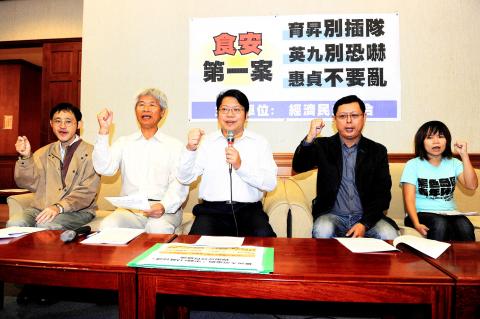Several civic groups yesterday accused the government of exaggerating the potential impact of an impending free-trade agreement (FTA) between China and South Korea after the two countries’ leaders concluded talks on the accord at the APEC summit on Monday.
While the Presidential Office has said the agreement would allow South Korea to further outpace Taiwan in key economic sectors, critics say the government is overstating the impact of the treaty to force the passage of several cross-strait trade agreements and related legislation.
The groups voiced their opposition to a motion by Chinese Nationalist Party (KMT) Legislator Chiang Hui-chen (江惠貞) to place a proposed bill to monitor future cross-strait treaties at the top of today’s legislative agenda, to pave the way for the passage of the cross-strait service trade agreement.

Photo: Chen Chih-chu, Taipei Times
Economic Democracy Union convener Lai Chung-chiang (賴中強) said that legislation to monitor food safety should be prioritized in the wake of the series of tainted oil scandals that rocked the nation.
“The KMT should stop its media campaign to scare the public about the threat engendered by the China-South Korea FTA,” Lai said, adding that the oversight bill should not “cut in line” before food safety concerns.
The agreement between China and South Korea still has to undergo legal and parliamentary review, Lai said, adding that it will likely take at least six months before it takes effect.
Lai rebutted claims by the Ministry of Economic Affairs that the agreement would inflict a serious blow on seven Taiwanese industries — petrochemicals, LCD panels, automobiles, machine tools, steel, textiles and glass — saying that most of these industries cater to the domestic market, with only petrochemicals relying on exports to China.
The free-trade pact aims to achieve an 85 percent reduction in tariffs between China and South Korea over the course of 10 to 20 years, Lai said, challenging the ministry’s economic impact assessments, which he said were based the elimination of tariffs.
The deal would not have a big impact on Taiwanese exports to China, as many of these industrial goods — accounting for about 69 percent of total exports last year — are already tariff-exempt, Lai said.
Taiwan Labor Front secretary-general Son Yu-liam (孫友聯) said the petrochemical industry was the main force pushing for the passage of the under-negotiation cross-strait trade in goods agreement, and accused the government of acting as a “comprador” for “high-polluting” petrochemical firms.
The pending agreement between China and South Korea is a “low-level” FTA whose political significance outweighs its economic benefits, Son added.

SHIPS, TRAINS AND AUTOMOBILES: The ministry has announced changes to varied transportation industries taking effect soon, with a number of effects for passengers Beginning next month, the post office is canceling signature upon delivery and written inquiry services for international registered small packets in accordance with the new policy of the Universal Postal Union, the Ministry of Transportation and Communications said yesterday. The new policy does not apply to packets that are to be delivered to China, the ministry said. Senders of international registered small packets would receive a NT$10 rebate on postage if the packets are sent from Jan. 1 to March 31, it added. The ministry said that three other policies are also scheduled to take effect next month. International cruise ship operators

HORROR STORIES: One victim recounted not realizing they had been stabbed and seeing people bleeding, while another recalled breaking down in tears after fleeing A man on Friday died after he tried to fight the knife-wielding suspect who went on a stabbing spree near two of Taipei’s busiest metro stations, Taipei Mayor Chiang Wan-an (蔣萬安) said. The 57-year-old man, identified by his family name, Yu (余), encountered the suspect at Exit M7 of Taipei Main Station and immediately tried to stop him, but was fatally wounded and later died, Chiang said, calling the incident “heartbreaking.” Yu’s family would receive at least NT$5 million (US$158,584) in compensation through the Taipei Rapid Transit Corp’s (TRTC) insurance coverage, he said after convening an emergency security response meeting yesterday morning. National

PLANNED: The suspect visited the crime scene before the killings, seeking information on how to access the roof, and had extensively researched a 2014 stabbing incident The suspect in a stabbing attack that killed three people and injured 11 in Taipei on Friday had planned the assault and set fires at other locations earlier in the day, law enforcement officials said yesterday. National Police Agency (NPA) Director-General Chang Jung-hsin (張榮興) said the suspect, a 27-year-old man named Chang Wen (張文), began the attacks at 3:40pm, first setting off smoke bombs on a road, damaging cars and motorbikes. Earlier, Chang Wen set fire to a rental room where he was staying on Gongyuan Road in Zhongzheng District (中正), Chang Jung-hsin said. The suspect later threw smoke grenades near two exits

The Forestry and Nature Conservation Agency yesterday launched a gift box to market honey “certified by a Formosan black bear” in appreciation of a beekeeper’s amicable interaction with a honey-thieving bear. Beekeeper Chih Ming-chen (池明鎮) in January inspected his bee farm in Hualien County’s Jhuosi Township (卓溪) and found that more than 20 beehives had been destroyed and many hives were eaten, with bear droppings and paw prints near the destroyed hives, the agency said. Chih returned to the farm to move the remaining beehives away that evening when he encountered a Formosan black bear only 20m away, the agency said. The bear